Did you know that Darjeeling’s tea plantations produce over 9 million kilograms of the world’s finest tea annually, often called the “Champagne of Teas”? Perched at 2,050 meters above sea level in West Bengal, this enchanting hill station offers more than just its famous brew. With breathtaking Himalayan vistas, colonial heritage, and vibrant cultural experiences, Darjeeling captivates travelers seeking both adventure and tranquility.
Getting to Darjeeling
The historic Darjeeling Himalayan Railway offers a scenic journey to the hill station
Reaching this Himalayan gem requires some planning, but the journey itself becomes part of the adventure. The nearest airport is Bagdogra Airport (IXB), approximately 80 km from Darjeeling. From there, you have several options to reach the hill station.
By Train
The most iconic way to reach Darjeeling is aboard the UNESCO-listed Darjeeling Himalayan Railway, affectionately known as the “Toy Train.” This narrow-gauge railway climbs from New Jalpaiguri (NJP) station through stunning landscapes to Darjeeling. The journey takes about 7 hours but offers unforgettable views. For a quicker option, take a regular train to NJP station, then continue by road.
By Road
From Bagdogra Airport or NJP station, shared jeeps and private taxis regularly depart for Darjeeling. The winding mountain road journey takes approximately 3-4 hours, offering spectacular scenery along Hill Cart Road. For budget travelers, government buses also operate on this route, though they take longer.
Best Time to Visit Darjeeling
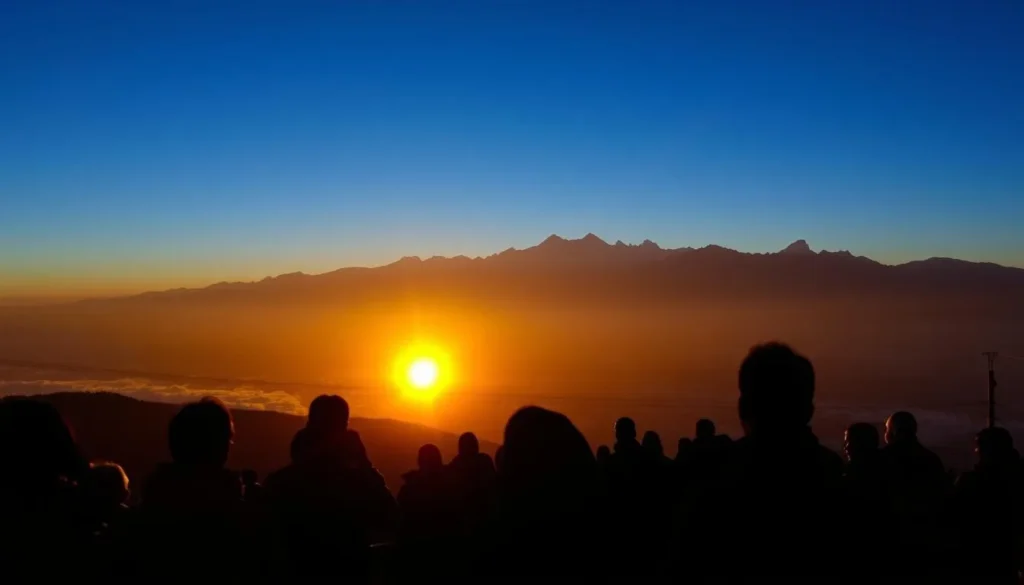
Spectacular sunrise view of Kanchenjunga from Tiger Hill
Darjeeling’s climate varies significantly throughout the year, making timing crucial for your visit:
| Season | Months | Temperature | Experience |
| Spring | March-May | 8°C-15°C | Blooming rhododendrons, clear mountain views |
| Summer | June-August | 13°C-19°C | Pleasant escape from plains heat, occasional rain |
| Autumn | September-November | 7°C-14°C | Clearest views, ideal for photography |
| Winter | December-February | 2°C-10°C | Occasional snow, fewer tourists |
The ideal times to visit are spring (March-May) and autumn (September-November) when the weather is pleasant and mountain views are at their clearest. Autumn particularly offers spectacular visibility of the Himalayan range, making it perfect for photography enthusiasts.
Where to Stay in Darjeeling
Darjeeling offers accommodation options ranging from heritage hotels housed in colonial buildings to budget-friendly guesthouses. The Mall Road and Chowrasta areas are most convenient for tourists, providing easy access to major attractions and restaurants.
Heritage Hotels
For a taste of colonial charm, consider staying at one of Darjeeling’s heritage properties like the Windamere Hotel or The Elgin. These historic establishments offer afternoon tea services and period furnishings that transport you back to the British Raj era.
Mid-Range Options
Several well-appointed hotels around the Mall Road area offer comfortable rooms with mountain views at reasonable prices. Many include amenities like in-house restaurants serving local cuisine and arranged sightseeing services.
Budget Stays
Backpackers and budget travelers will find numerous guesthouses and hostels, particularly in the areas slightly away from the town center. These provide basic but clean accommodations at affordable rates.
Top 10 Things to Do in Darjeeling
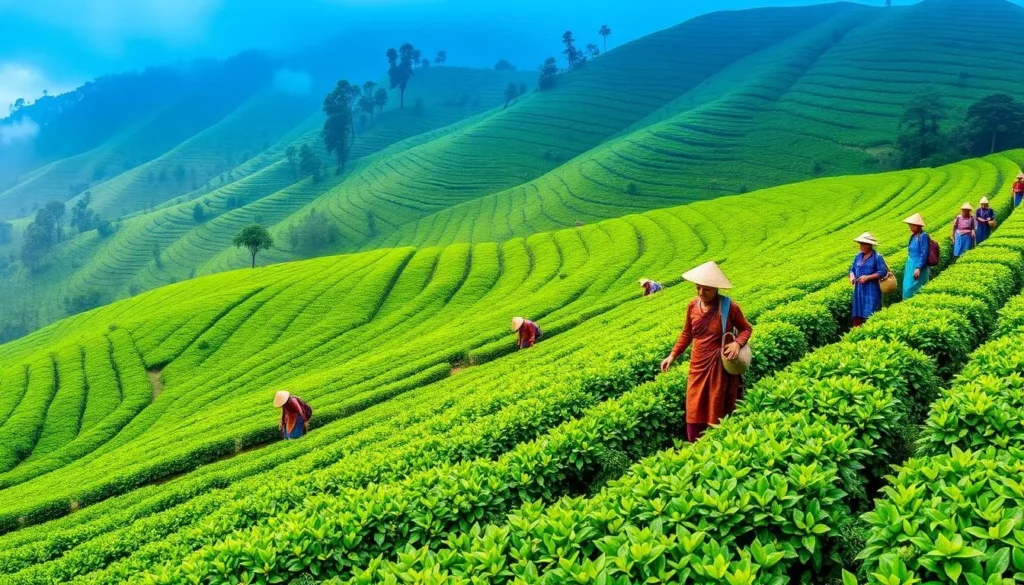
Tea pickers harvesting the famous Darjeeling tea leaves
1. Witness Sunrise at Tiger Hill
No visit to Darjeeling is complete without experiencing the magical sunrise from Tiger Hill. At 2,590 meters above sea level, this vantage point offers breathtaking views of the sun’s first rays illuminating Kanchenjunga, the world’s third-highest mountain. On clear days, you can even spot Mount Everest in the distance. The predawn jeep ride through misty forests adds to the adventure.
2. Ride the Darjeeling Himalayan Railway
The UNESCO World Heritage Darjeeling Himalayan Railway, fondly called the “Toy Train,” is an engineering marvel from 1881. The narrow-gauge steam locomotive chugs along at a leisurely pace, offering spectacular views as it navigates hairpin bends and steep gradients. The most popular joy ride runs between Darjeeling and Ghum, India’s highest railway station, taking about 2 hours round trip.
3. Visit Happy Valley Tea Estate
Established in 1854, Happy Valley Tea Estate is one of Darjeeling’s oldest and most accessible tea plantations. Take a guided tour to learn about the tea-making process from plucking to packaging. The estate produces the region’s famous “champagne of teas,” and you can sample different varieties during a tasting session. The meticulously maintained gardens also provide excellent photo opportunities with mountain backdrops.
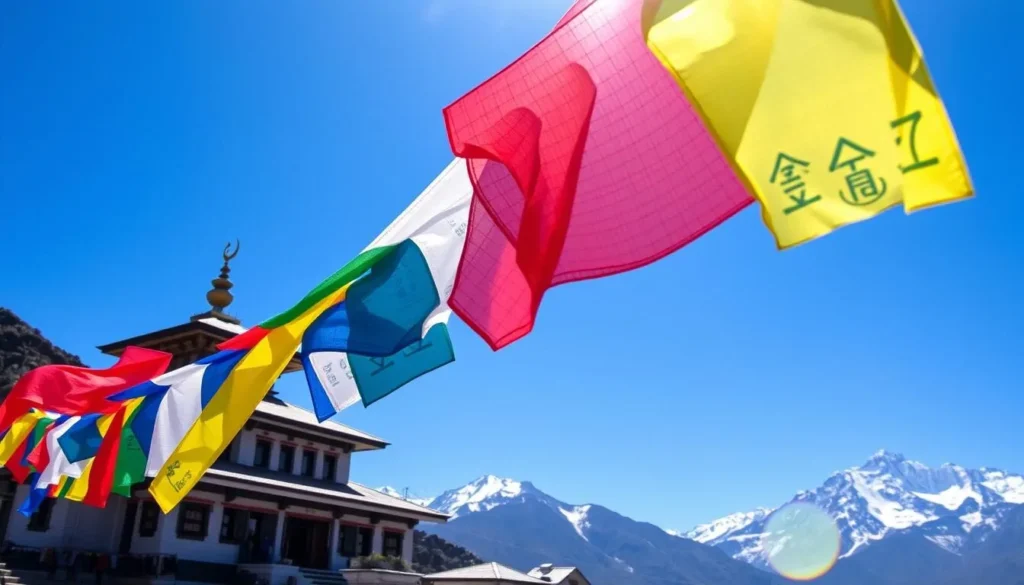
Colorful prayer flags at Ghoom Monastery with Himalayan backdrop
4. Explore Buddhist Monasteries
Darjeeling’s significant Tibetan influence is evident in its numerous Buddhist monasteries. Ghoom Monastery (Yiga Choeling), built in 1875, houses a 15-foot statue of the Maitreya Buddha and rare Buddhist manuscripts. The Bhutia Busty Gompa, originally built on Observatory Hill before being relocated, features beautiful murals depicting Buddha’s life. Join the monks for their afternoon prayer ceremonies for an authentic cultural experience.
5. Visit the Himalayan Mountaineering Institute
Established in 1954 following the first successful Everest expedition, the Himalayan Mountaineering Institute honors Tenzing Norgay, who spent much of his life in Darjeeling. The museum displays equipment from historic climbing expeditions, including those used in the first Everest summit. The adjacent Padmaja Naidu Himalayan Zoological Park houses rare Himalayan species like red pandas, snow leopards, and Tibetan wolves in naturalistic habitats.

Endangered red panda at Padmaja Naidu Himalayan Zoological Park
6. Stroll Through Chowrasta and Mall Road
The heart of Darjeeling’s social life centers around Chowrasta, a pedestrian-only plaza where locals and tourists gather. Enjoy mountain views from the benches, browse bookstores selling rare Himalayan titles, or sip Darjeeling tea at a café. The surrounding Mall Road offers shopping opportunities for local handicrafts, woolen items, and tea. Horse rides around the plaza are popular with families.
7. Take the Darjeeling Ropeway
For panoramic views of tea gardens and valleys, take the Darjeeling-Rangeet Valley Passenger Ropeway, locally known as the “Darjeeling Ropeway.” The cable car descends from North Point in Darjeeling to Singla Bazar, covering 2.5 kilometers. Each cabin accommodates 6 passengers and offers breathtaking views of tea estates, dense forests, and the Rangeet River below.
8. Visit the Japanese Peace Pagoda
The gleaming white Japanese Peace Pagoda, built in the 1970s, promotes world peace and harmony. Standing 28 meters tall, this Buddhist stupa offers panoramic views of Darjeeling town and the surrounding mountains. Visitors can participate in the morning and evening drumming ceremonies at the temple below the pagoda. The serene atmosphere makes it perfect for meditation and reflection.
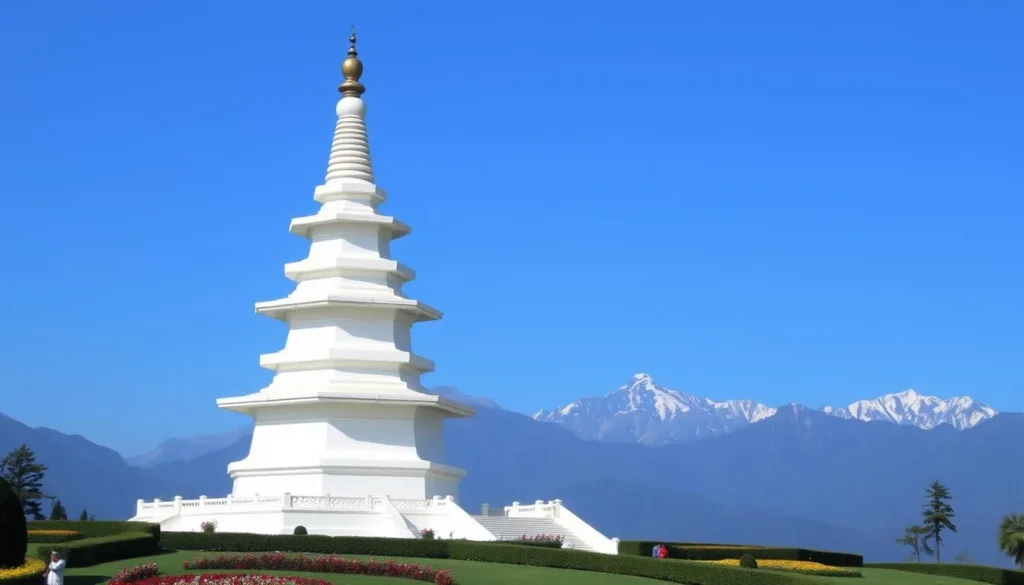
The serene Japanese Peace Pagoda offers panoramic views of Darjeeling
9. Explore Observatory Hill
Observatory Hill represents Darjeeling’s religious harmony, with both Hindu and Buddhist shrines coexisting. Colorful prayer flags create a vibrant canopy above the hilltop temple dedicated to Mahakala. The site offers excellent views of Darjeeling town and, on clear days, Kanchenjunga. Watch for the playful Rhesus macaques that inhabit the area, but keep food items secured.
10. Sample Tibetan Cuisine
Darjeeling’s Tibetan influence extends to its cuisine. Try authentic dishes like momos (steamed dumplings), thukpa (noodle soup), and gyathuk (a hearty stew). Glenary’s, Kunga Restaurant, and Dekevas are popular establishments serving both traditional Tibetan fare and fusion dishes. Don’t miss trying sel roti, a sweet rice bread that’s a local specialty.
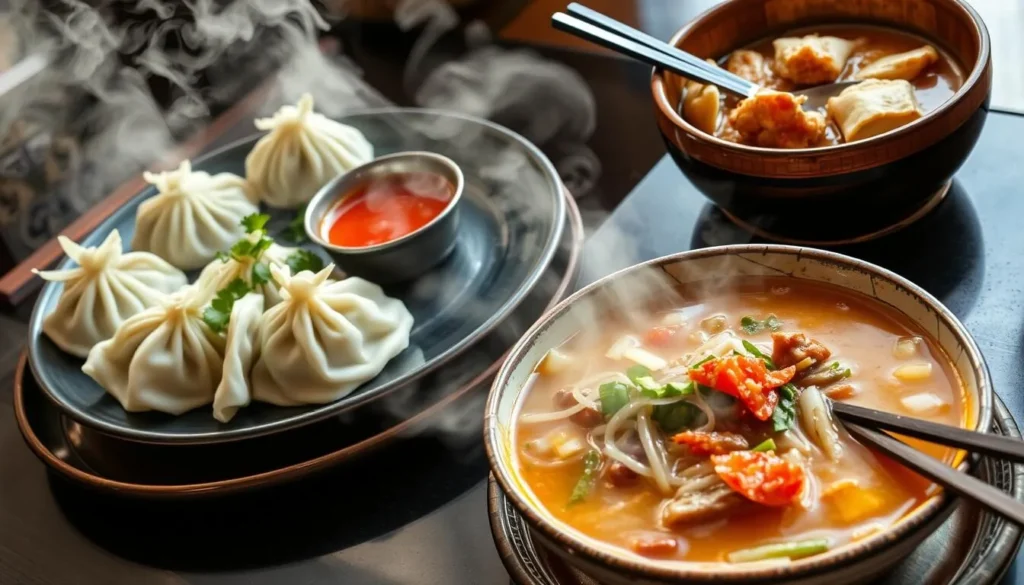
Authentic Tibetan momos and thukpa, must-try dishes in Darjeeling
Day Trips from Darjeeling
While Darjeeling offers plenty to explore, several nearby destinations make for excellent day excursions:
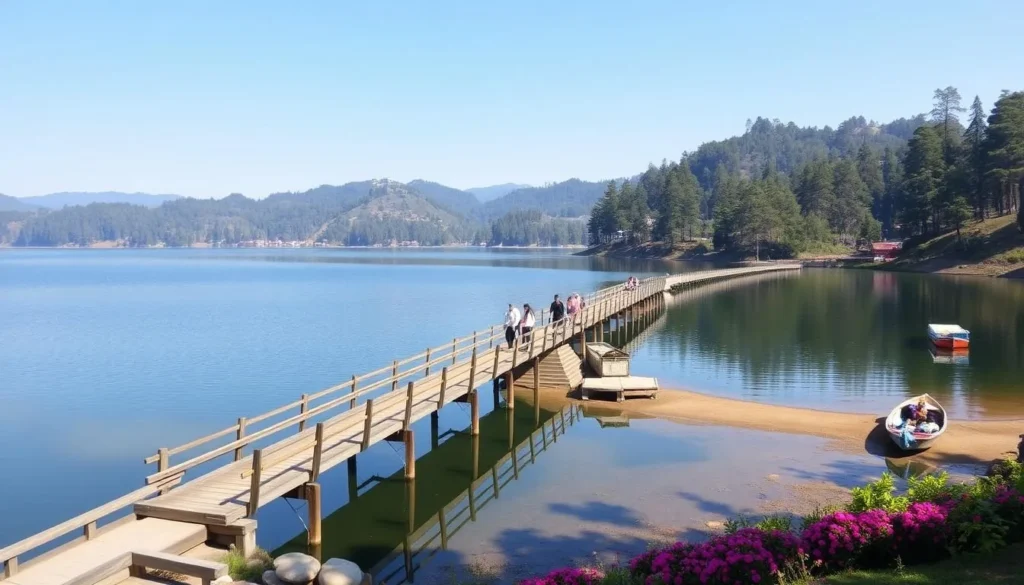
Scenic Mirik Lake, a popular day trip destination from Darjeeling
Mirik
About 49 km from Darjeeling, Mirik centers around a beautiful lake surrounded by pine forests. Enjoy boating on Sumendu Lake, visit the Bokar Monastery, or walk across the 80-foot footbridge spanning the lake. The journey itself offers views of tea gardens and cardamom plantations.
Kalimpong
This hill town, 51 km from Darjeeling, is known for its flower nurseries and Buddhist monasteries. Visit Delo Hill for panoramic views, explore the colonial-era MacFarlane Church, and browse the traditional market for local handicrafts.
Kurseong
Located 30 km from Darjeeling on the way to Siliguri, Kurseong is known as the “Land of White Orchids.” Visit the Dow Hill Forest Reserve, Eagle’s Craig viewpoint, and tea factories like Makaibari and Castleton.
Practical Tips for Visiting Darjeeling
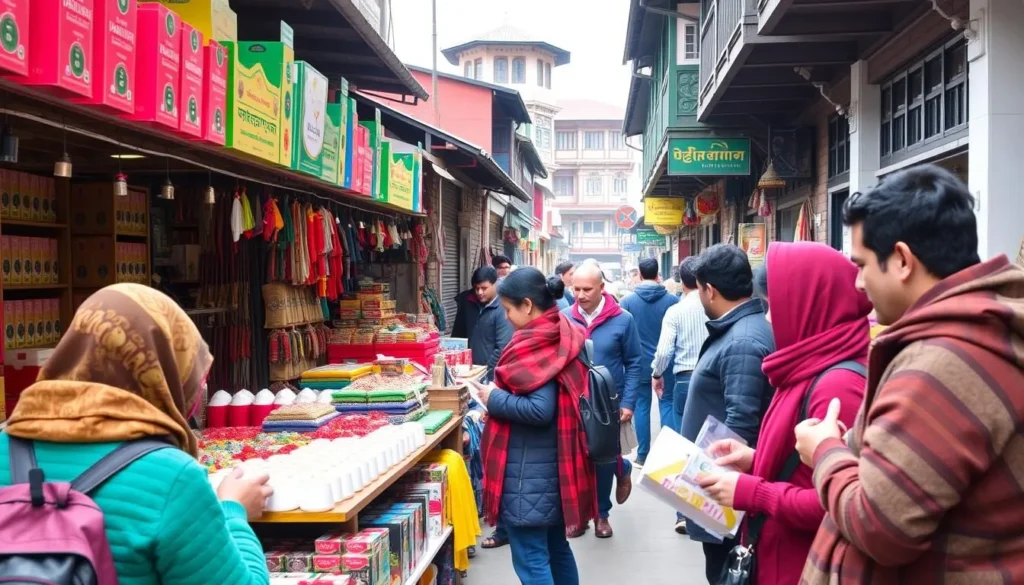
Shopping for tea and souvenirs at Mall Road market
Getting Around
Darjeeling’s steep terrain makes walking challenging but rewarding. For longer distances, shared jeeps connect major points within town. For sightseeing beyond walking distance, hire a taxi for half or full-day tours. Rates are typically negotiable but agree on prices beforehand.
What to Pack
Even in summer, Darjeeling evenings can be cool. Pack layers, including a light jacket or sweater. Comfortable walking shoes are essential for navigating the hilly terrain. During monsoon season (June-September), bring waterproof clothing and sturdy footwear. Don’t forget sunscreen, as the higher altitude intensifies sun exposure.
Money Matters
While larger establishments accept cards, many smaller shops and restaurants are cash-only. ATMs are available around Mall Road and Chowrasta, but it’s advisable to carry sufficient cash, especially when visiting remote attractions.
Darjeeling Travel Pros
- Breathtaking Himalayan views
- Rich cultural diversity
- World-famous tea experiences
- Pleasant climate year-round
- Excellent hiking opportunities
Darjeeling Travel Challenges
- Steep terrain can be tiring
- Monsoon season limits visibility
- Water shortages can occur
- Limited nightlife options
- Roads can be congested during peak season
Communication
Mobile connectivity is generally good in Darjeeling town, with all major Indian networks available. Wi-Fi is offered in most hotels and many cafés, though connection speeds may vary. Learning a few basic Bengali or Nepali phrases can enhance your interaction with locals.
Local Etiquette and Cultural Tips
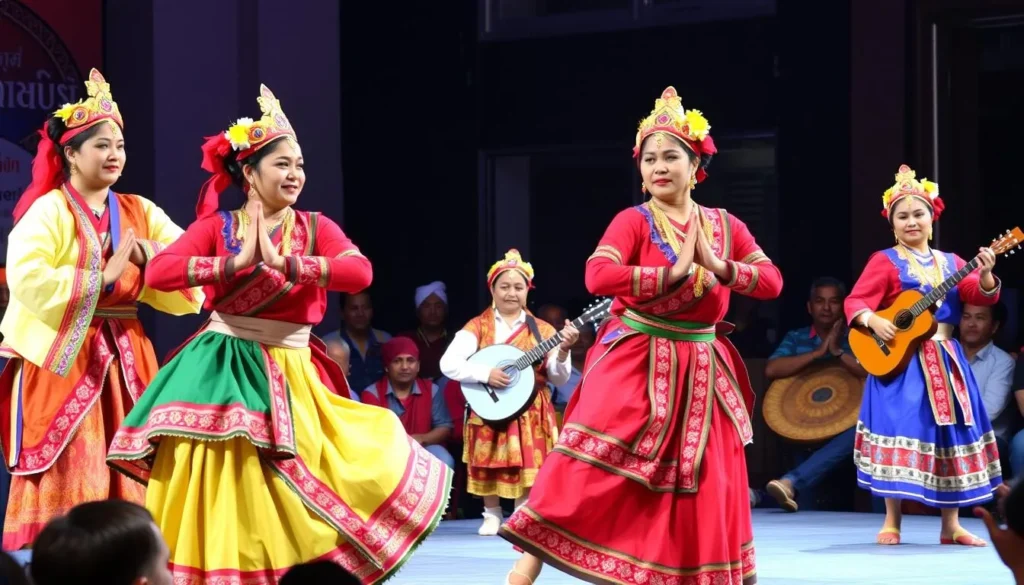
Traditional cultural performance showcasing Darjeeling’s diverse heritage
Darjeeling’s unique cultural blend of Nepali, Tibetan, and Bengali influences creates a diverse social tapestry. Respecting local customs enhances your experience:
When visiting monasteries, dress modestly covering shoulders and knees. Remove shoes before entering prayer halls, and walk clockwise around religious structures and prayer wheels. Photography may be restricted in certain areas, so always ask permission first.
When visiting tea estates, stay on designated paths to avoid damaging tea plants. If photographing tea pickers, politely ask permission first. Tipping for services is customary; 10% at restaurants and small amounts for guides and drivers are appreciated.
Local Insight: When accepting anything from locals, use your right hand or both hands together as a sign of respect. This small gesture is greatly appreciated and demonstrates cultural awareness.
Food and Drink Experiences
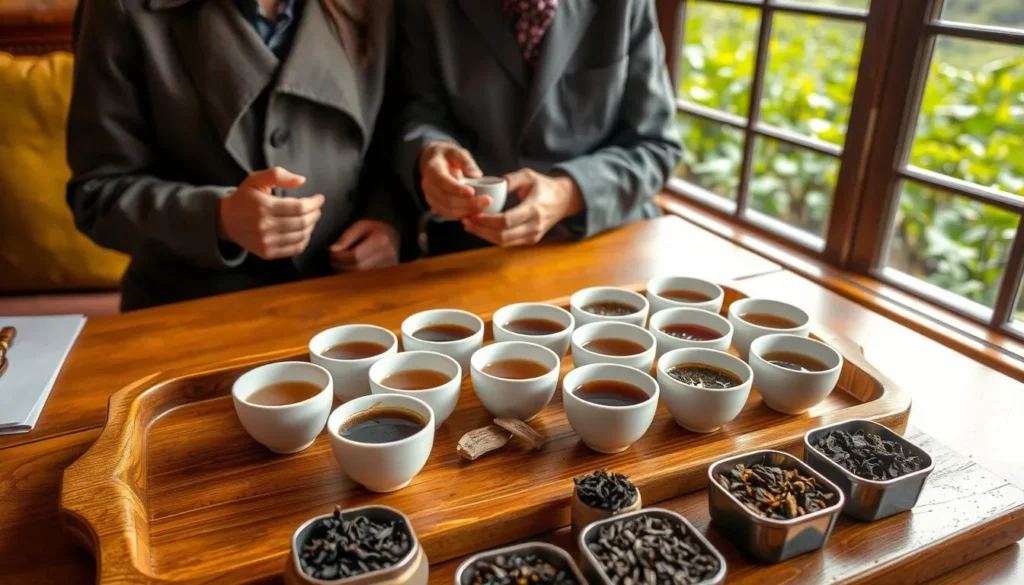
Tea tasting session featuring different flushes of Darjeeling tea
Darjeeling’s culinary scene reflects its multicultural heritage, offering everything from Tibetan specialties to Anglo-Indian fusion dishes:
Must-Try Local Dishes
- Momos – Steamed or fried dumplings filled with vegetables or meat, served with spicy sauce
- Thukpa – Hearty noodle soup with vegetables and optional meat
- Sel Roti – Ring-shaped sweet rice bread, often enjoyed with tea
- Gundruk – Fermented leafy green soup, a traditional Nepali dish
- Shaphaley – Tibetan bread stuffed with seasoned meat and cabbage
Tea Experiences
No visit to Darjeeling is complete without exploring its tea culture. The region produces four distinct “flushes” (harvests) throughout the year, each with unique characteristics. First flush (spring) teas are delicate with floral notes, while second flush (summer) produces the classic “muscatel” flavor. Autumn and winter flushes offer stronger, more robust profiles.
Where to Eat
Darjeeling offers dining options for every budget and taste preference:
Budget-Friendly Options
- Kunga Restaurant – Authentic Tibetan cuisine
- Hasty Tasty – Local favorites at reasonable prices
- Hot Stimulating Cafe – Budget-friendly snacks and beverages
Mid-Range to Upscale
- Glenary’s – Colonial-era bakery and restaurant
- Gatty’s Cafe – Continental cuisine with mountain views
- Elgin Hotels – Traditional high tea experience
Shopping in Darjeeling
Darjeeling offers unique shopping opportunities, from world-famous teas to handcrafted souvenirs:
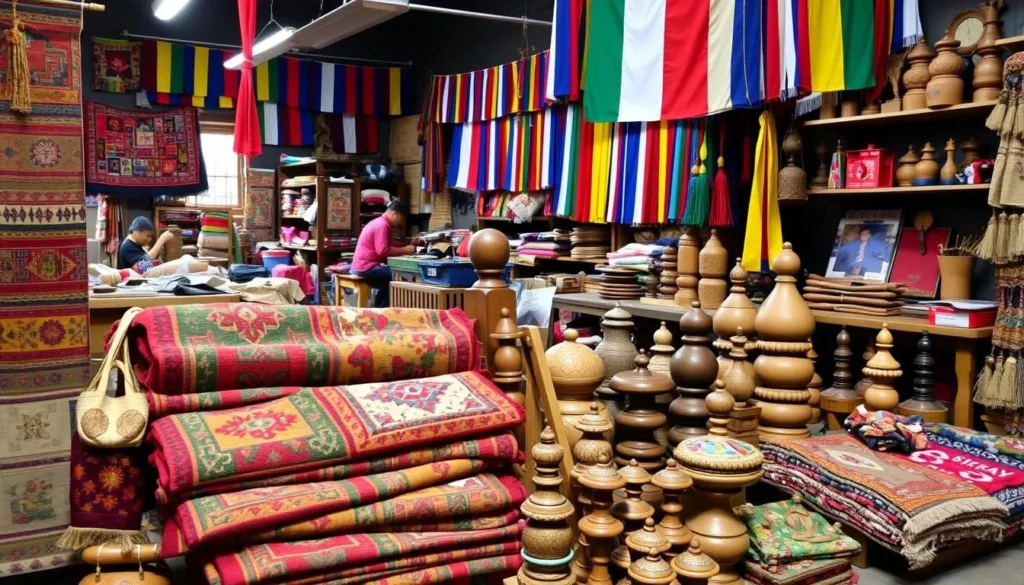
Handcrafted items at the Tibetan Refugee Self-Help Centre
What to Buy
- Darjeeling Tea – Purchase directly from estates or certified shops like Nathmulls Tea
- Tibetan Handicrafts – Prayer flags, thangka paintings, and handwoven carpets
- Woolen Items – Locally made shawls, scarves, and sweaters
- Himalayan Art – Paintings depicting mountain landscapes and Buddhist themes
- Copper Items – Traditional kitchenware and decorative pieces
Where to Shop
The Tibetan Refugee Self-Help Centre offers authentic handicrafts while supporting the Tibetan refugee community. Established in 1959, the center provides employment to refugees through traditional crafts. Visitors can watch artisans at work and purchase directly from the source.
Darjeeling’s Mall Road and Chowrasta area house numerous shops selling tea, handicrafts, and souvenirs. For tea purchases, visit established vendors like Nathmulls or Golden Tips Tea for authentic, quality products with proper packaging for travel.
Shopping Tip: When purchasing Darjeeling tea, look for the Darjeeling logo certification mark that guarantees authenticity. Tea grades are marked from SFTGFOP (highest) to Dust (lowest), with higher grades commanding premium prices.
Frequently Asked Questions
How many days do I need to explore Darjeeling properly?
A minimum of 3-4 days is recommended to experience Darjeeling’s major attractions. Add 1-2 additional days if you plan to take day trips to nearby destinations like Mirik or Kalimpong.
Is Darjeeling safe for solo travelers?
Darjeeling is generally safe for solo travelers, including women. The local population is friendly and helpful. Standard precautions like avoiding isolated areas after dark and securing valuables apply, as with any tourist destination.
Do I need permits to visit Darjeeling?
Indian nationals don’t need permits to visit Darjeeling. Foreign tourists only need standard Indian visas, with no additional permits required for Darjeeling itself. However, if planning to trek to Sandakphu or visit certain border areas, special permits may be necessary.
What’s the best way to see Tiger Hill sunrise?
The best way is to book a jeep tour through your hotel or a local travel agency. These typically depart around 3:30-4:00 AM to reach Tiger Hill before sunrise. Dress warmly as mornings are cold, and bring a thermos of hot tea for comfort while waiting.
Darjeeling Map and Location
Darjeeling is located in the northern part of West Bengal, India, in the foothills of the Himalayas.
Ready for Your Darjeeling Adventure?
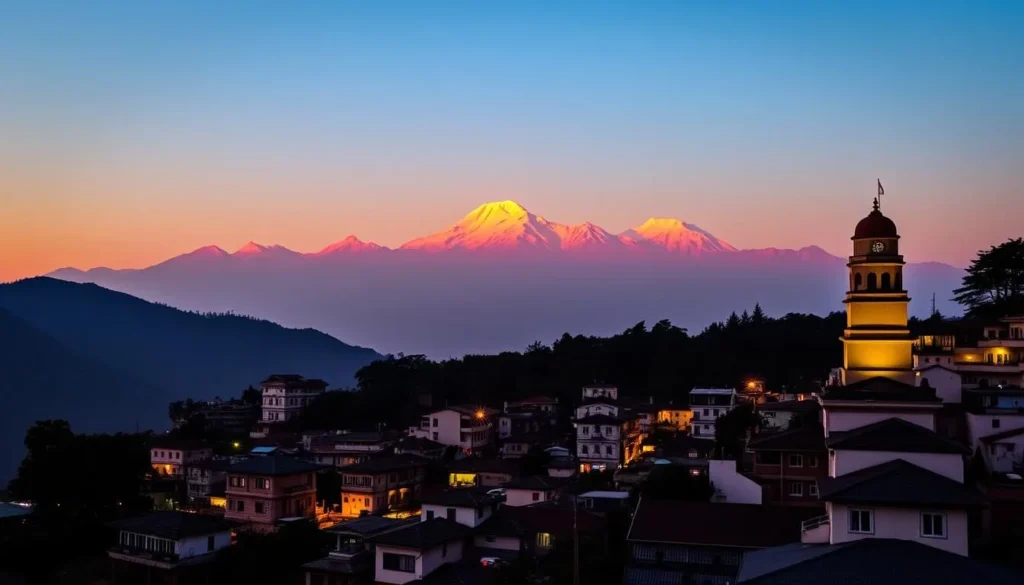
Magical sunset over Darjeeling with Kanchenjunga mountains in the background
Darjeeling captivates visitors with its perfect blend of natural beauty, colonial heritage, and vibrant local culture. From sipping the world’s finest tea while gazing at snow-capped Himalayan peaks to exploring Buddhist monasteries and riding the historic toy train, this hill station offers experiences that linger in memory long after your visit.
Whether you’re seeking adventure, cultural immersion, or simply a peaceful mountain retreat, Darjeeling delivers with its charming blend of old-world elegance and stunning natural landscapes. Pack your bags, bring a camera, and prepare for an unforgettable journey to the Queen of the Hills!
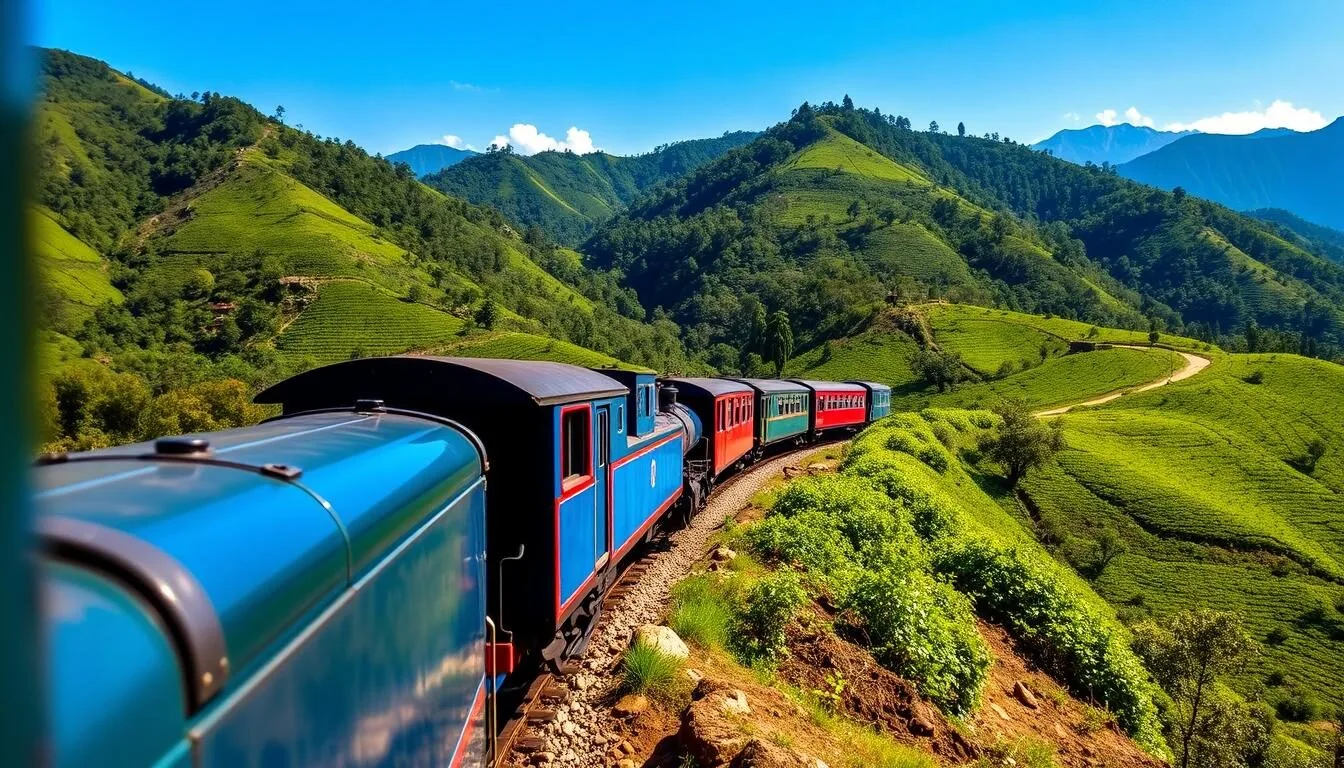
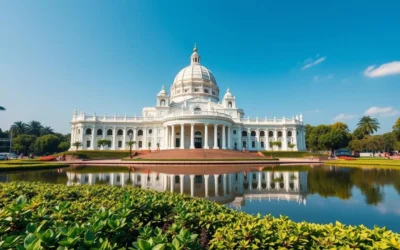
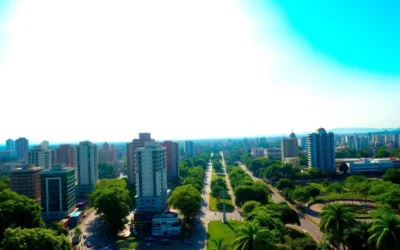
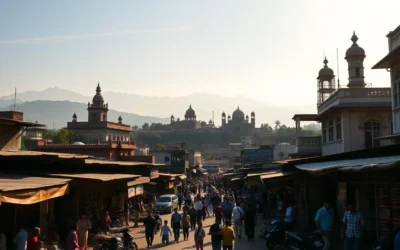
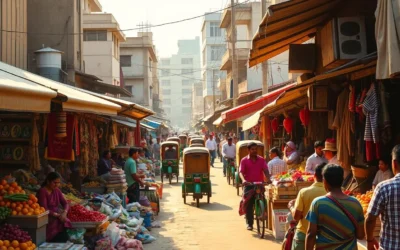
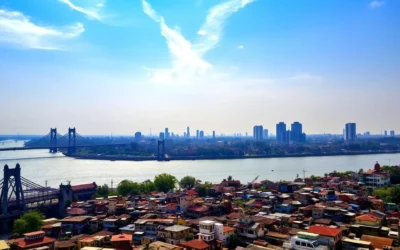

0 Comments